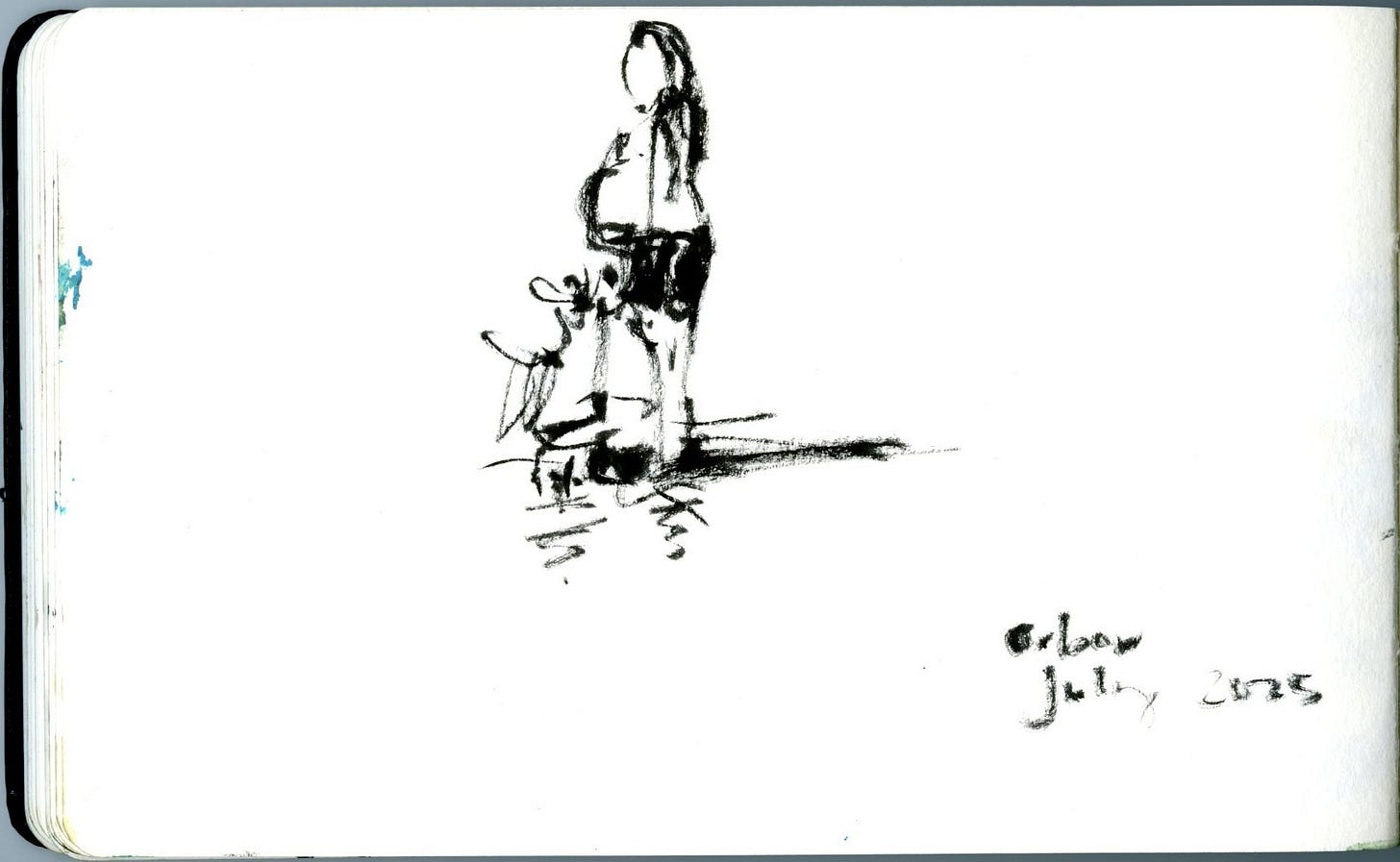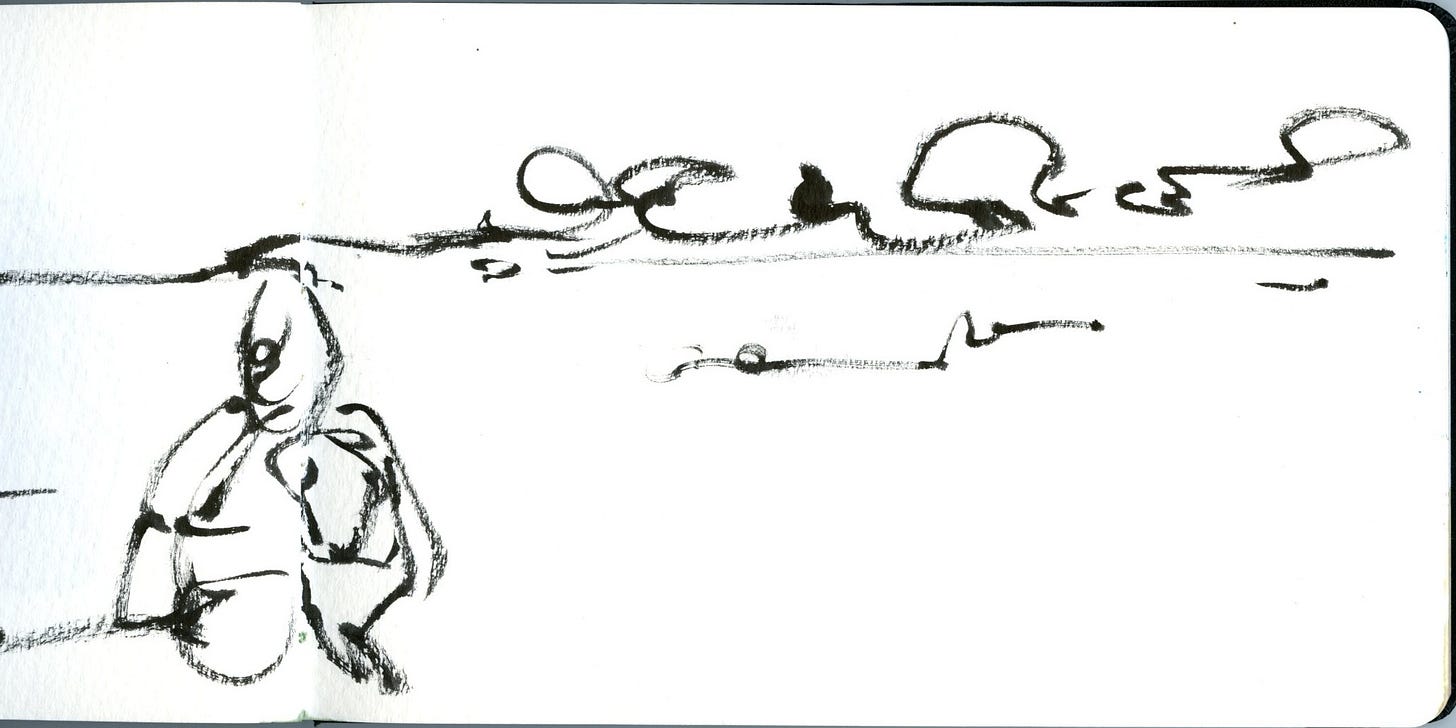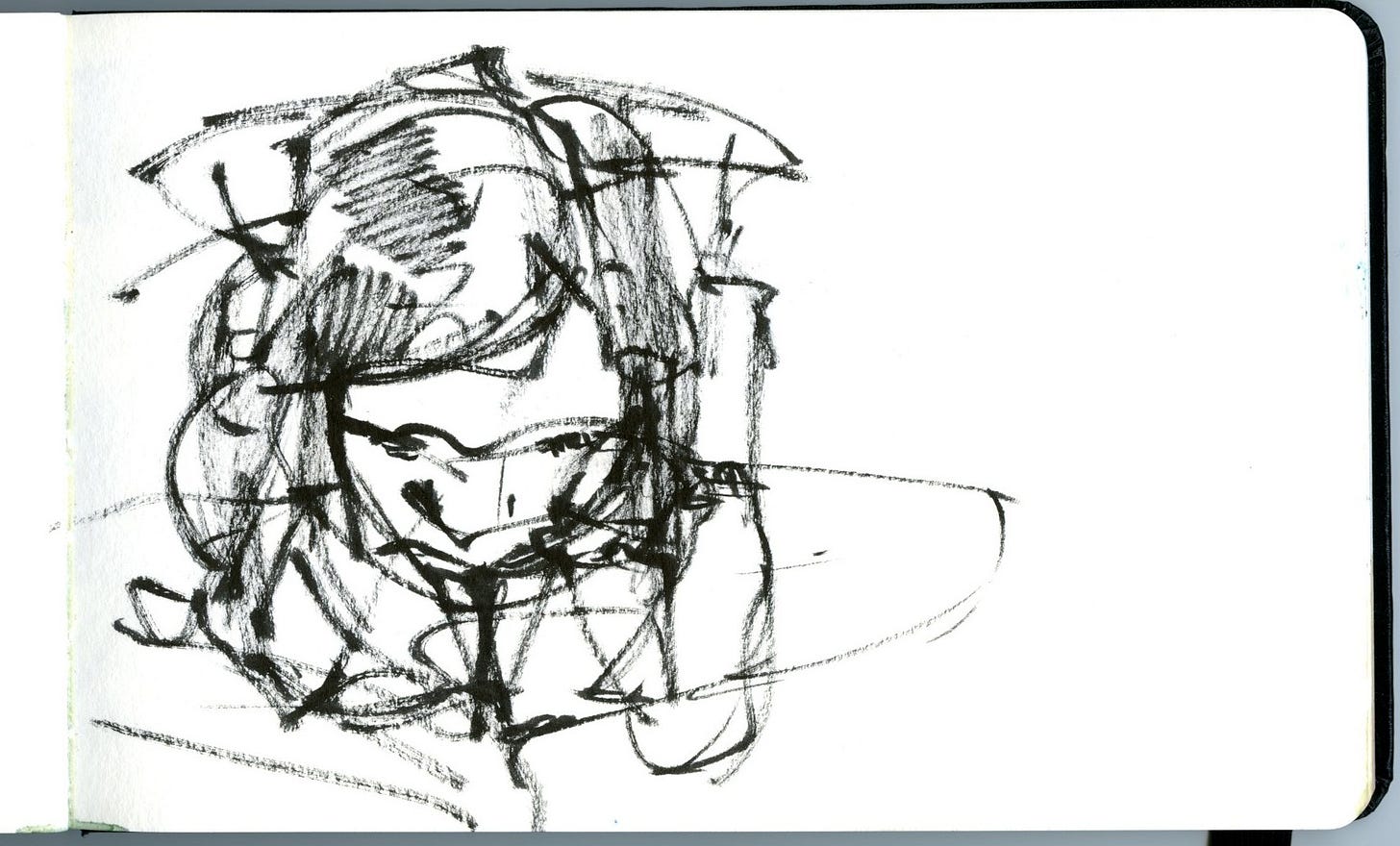Oxbow Island, Part 6
a flower ring, a kid hot tub, and a moment of feeling completely welcome
As I sat drawing, I noticed activity behind me. Lucy and Naomi were gathering flowers and placing them between the rocks they’d already put on the pile of wet sand that was serving as the anchor to Jim’s umbrella-on-a-stick shade station.
Bev peeled off from the group of moms in camping chairs a bit further down in front the log I was sitting on, and came over and sat next to me. She admired the sketches and we half started talking, but when I kept alternating between drawing and checking the radio for Jim (“This is KT4NGO, calling KF0RST”), she drifted back to the group. I kept drawing a bit longer, feeling pulled between my sketchbook under the shaded umbrella-haven, and the possibility of an adult conversation if I joined the circle of moms. I filled one more page, then capped my pen, closed the sketchbook with its rubber band, resituated my sun hat, and grabbed the little foldup chair Jim had bought for ham radio, and headed over to the circle, trying to open the chair on the way.
“Can I join you?” I asked, still struggling with the chair. There was a chorus of enthusiastic yeses. I got most of the chair’s telescoping legs clicked out, tried to sit down, and fell over, to friendly laughter. “What were you drawing?” asked a woman once I’d sat down successfully. She was wearing a full-body rash guard, complete with a hood and visor. The fabric had a beautiful turquoise and purple pattern on it that reminded me of a mermaid tail. When I was drawing, I’d seen her play with her preschooler, and then, gently but without caving to his vociferous protests, and with the help of other moms, press him back to shore in order to go for a swim by herself. Everything about watching this had felt wonderful: that other people’s kids could also be clingy; that she was taking time for herself; that other people were helping her rather than giving her side-eye for leaving without her shouting child.
Bev jumped in to answer the mermaid mom. “Amira, I am going to brag on her because I know she won’t brag on herself. She’s a fantastic artist. She sells art all the time. You should get her to show you.”
I went back to get my sketchbook, and passed it around, feeling a bit self-conscious but also very welcome. Psychologists talk about unconditional warm regard, and how badly children (and all humans) need it. I felt it on my skin, their welcome, and was a little embarrassed by how hungrily I soaked it up.
“What do you do in your sketchbook?” Amira wanted to know.
“You mean what do I do with the art?”
“No, I don’t care what you do with it—what do you do? How do you make the drawings? How did you get started with art?”
I deliberated briefly about giving the polite two-sentence answer and waiting to see whether they follow up before you go on for longer, but then I threw caution to the wind and dove in. “Well, my brothers and I were really different, all three of us—which is a big credit to my parents. They let us each be who we were. My mom especially really paid attention to what we liked and were good at. She noticed that I liked drawing, and so—we lived in Germany at this point—she met a Hungarian illustrator at a flea market and arranged to give her son piano lessons in return for drawing lessons for me.
“Both of them swore they were getting the better end of the deal. The illustrator’s son was four, and one of those kids who sit down at the piano with no training and bang around but it actually sounds good. And my mom was not a concert pianist, but she was musical and great with kids, and really good at putting things at their level, noticing what held their interest, keeping things fun.” I took a breath, realizing I’d lost the thread a bit. “And I got professional art lessons.”
“Wow!” Amira said. “I’m really glad I asked. This is a great story.”
“So I always liked drawing, but in a funny way, having kids has helped me sketch differently—I think maybe because I have less time and so it has to just happen and there’s no room for being fussy. Or maybe because parenting gives me more perspective on what matters, and that learning is really about trying it and falling down and getting up. I’m not sure, but I have a lot more courage with drawing now. I just go for it more.”
“I really like how you can—I don’t know—feel the movement in the drawings.”
I told her Wendy MacNaughton prefers drawing from life over photographs, because she feels like the drawings feel more alive, even if the details are less precise. The whole circle nodded. I felt amazed by the difference between my child self showing people drawings and my now-self (my mom had to coach me, as a child, not to reject all compliments by pointing out every single thing that was wrong with the drawing—It’s like you’re saying they’re wrong or stupid to like it. Just say ‘thanks.’). None of the sketchbook drawings were perfect, but it was okay. I liked them, fundamentally, and I liked that I’d made them. I liked myself, here with these women.
“It’s not just getting older, by the way,” Tanya said from my right. “It still takes a lot of courage to go for it.”
I looked at her. “I guess so. There are other areas where it’s harder for me, and you’re right, that hasn’t just gone away with age.”
“Can I get a closer look at your ring?” Tanya asked, looking at my right hand.
“Sure,” I said, starting to pull off the ring. “It’s my mom’s engagement—”
“Don’t take it off!” Bev cried. “I’m having visions of sand and lost heirlooms!”
I stopped, realizing she was right, and held my hand out to Tanya. “It’s beautiful,” she said, examining the thin gold band set with a small diamond surrounded by realistic, crenulated golden petals.
“Thank you,” I said. “Growing up, it was always the archetype of an engagement ring to me.”
”I can see why,” Tanya said.
“When Jim and I got engaged, my mom gave me her grandmother’s solitaire ring, and I wore it for a while, but it just felt wrong. I told her about it and she said ‘want to trade?’”
Bev whooped. “And you were like, score! Of course I do!”
Camelia came over, gesturing to the ‘hot tub’ some of the kids have built at the edge of the (very cold) river, by digging out a shallow hole and lining it with rocks. She sat down on a towel between Amira and Carly, who was on my left. “Listen to this. Gabi just came over to the kids in the hot tub and asked ‘have people been peeing in the hot tub?’ and every single one of the kids was like, ‘Yup.’ And Gabi nods, and gets straight in.”
There was a chorus of groans, howls, and giggles. “Right?!” Camelia adjusted her towel. “I am simultaneously grossed out and weirdly impressed by their matter-of-fact-ness.”
“‘Like, of course we have,’” someone said, and someone else added, “‘why do you think it’s warm?’”




